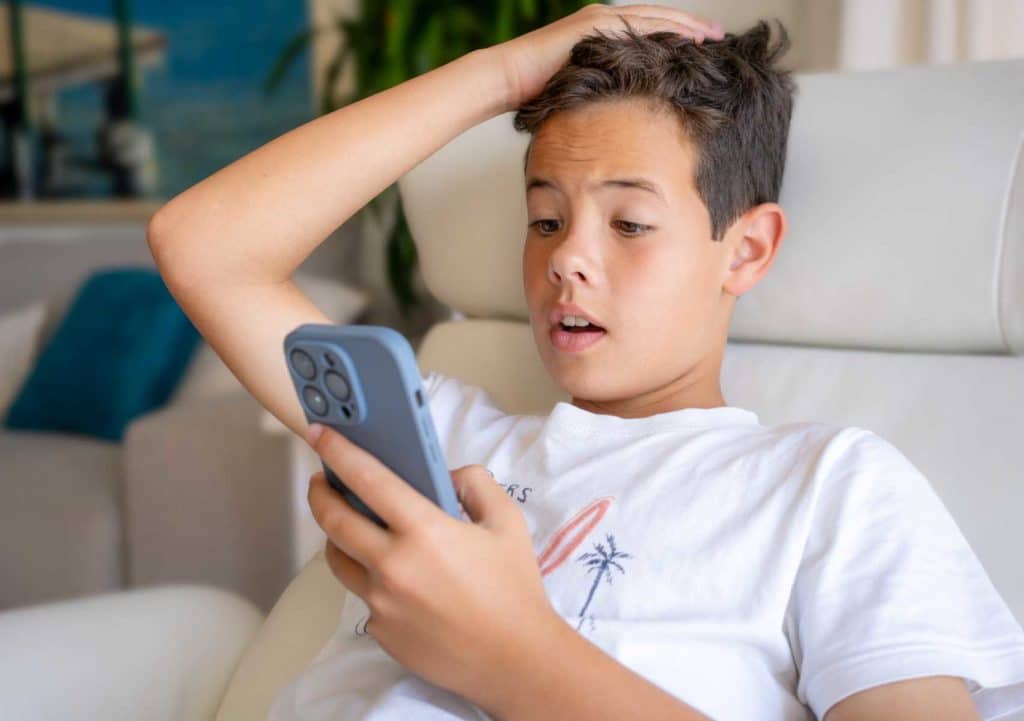
My 11-year-old has a phone. Judge me or not—we all do what’s best for our own families. He’s our youngest and because our teens are so busy with sports and extracurricular activities, he’s home alone a lot. Also, he’s old enough to get dropped off at the park to go fishing or walk to a friend’s house and it’s easier to get a hold of him if he brings a phone with him.
So when my older two got new iPhones for Christmas, we passed down an old phone to our tween boy and explained the tech rules he must follow to maintain this privilege.
One of them was to never give his name, personal information, or show his face to someone he doesn’t know. And as it turns out, having that conversation saved him from a potentially dangerous situation.
Related: The Ultimate Parent Resource Guide For Teen Tech Use, Social Media and Safety
A Message from an Unknown Person
“Mom, somebody I don’t know is trying to talk to me,” he said.
And when I looked at his phone, I was immediately alarmed. It was textbook creepy stranger behavior—and this creepy stranger was trying to get access to my kid.
“Do you want to play Roblox? Call me,” the initial message read, followed by, “What should I call you?” The person then added two friendly avatar images—one with hands making a heart shape and one with him signaling the “call me” hand expression.
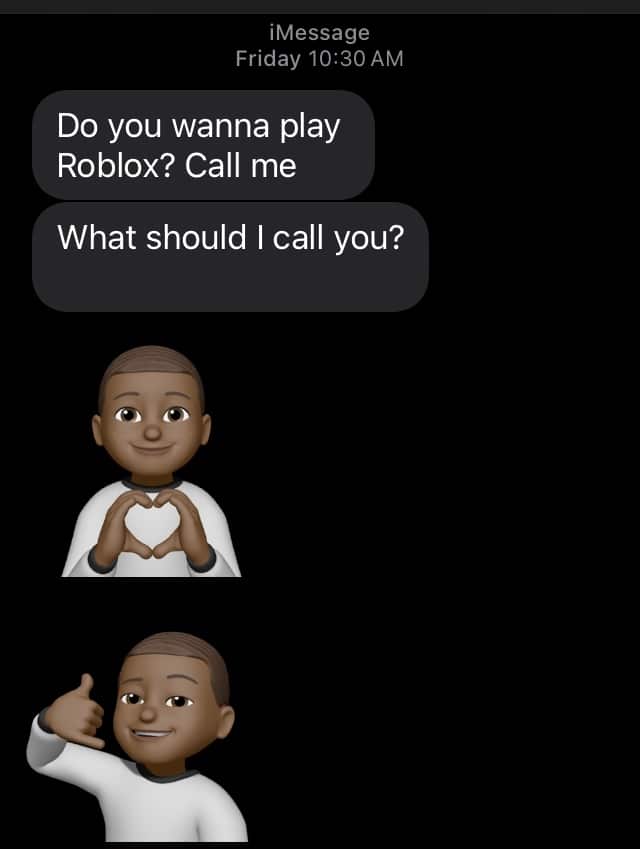
My son plays travel hockey year-round and has played on endless spring hockey and fall hockey teams as well as his regular winter team every year. Also, he’s the most social kid I’ve ever met and tends to befriend anyone who will say more than three words to him. So, having someone unexpected reach out isn’t alarming, as he makes new friends all the time.
What’s alarming is what happened next.
Thankfully, My Son Knew How to Keep Himself Safe
When my son asked questions like “Who are you?” and “How do you know me?” the stranger offered no details and instead, began insisting that the two of them talk on the phone.
Statements like “I’m going to call you”…. “Can I just call you please”…. and “Just answer already” began flooding the conversation.
When my son said, “No” and “I’m not going to show you my face”, he was met with the response “Yes you are.” Also, unsettling statements like “wire it” and “I’m bigger, your little” appeared as well.
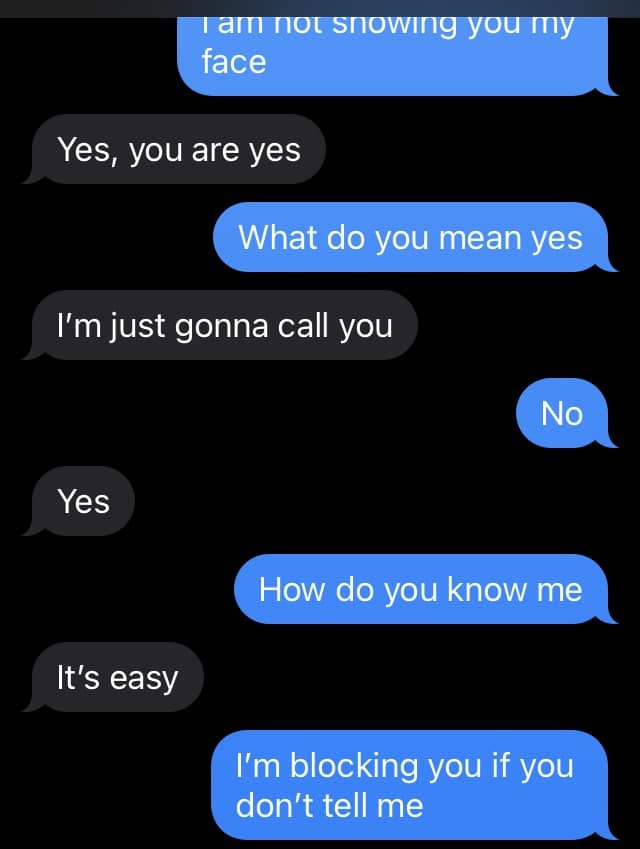

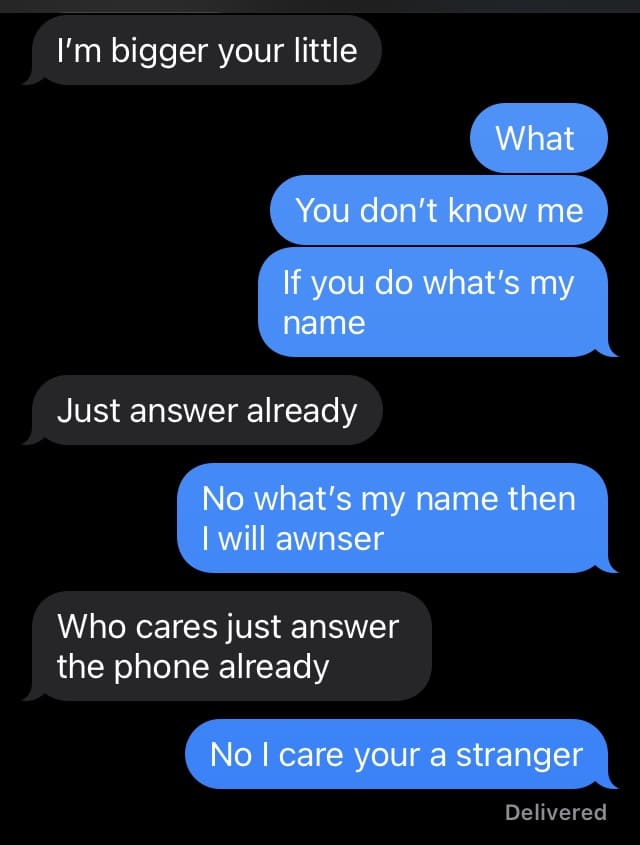
Related: Sextortion Is a Growing Problem for Teens: Here’s What Parents Need to Know
Next Came the Phone Calls
That’s when the FaceTime calls started. The phone rang over and over, and the second he hit “decline”, it rang again. They continued for a full minute or two, but my smart kid never answered, as he knew this creepy stranger really wanted to see his face.

We then blocked the number and haven’t heard from this person since. Looking back, we probably should have blocked them within the first few seconds of contact, but honestly, we were both a bit confused and trying to figure out what was going on. Did we know this person and they were just pranking my son? (11-year-old boys do stuff like that all the time, I’ve learned.)
And also, how would a stranger have gotten my child’s phone number? And how would they know he was a minor? As we were both processing this in real time, the calls kept coming.
Until we stopped them.
A Reminder to Talk to My Kids About Phone Safety
I shared this story with my mom-friends and I’m sharing here as a reminder to talk to your kids about strangers online. Make sure they know the importance of never sharing their faces, never sending pictures, never sharing their names or personal information like where they live, never answering a call if they don’t recognize the number, and—mostly importantly—telling you, their parents, or a trusted adult, when something seems off.
If my child had taken the bait from that very first text, “What should I call you?” and given this person their name, and then answered a FaceTime call through which this stranger could see his face, I’m honestly not sure what would have happened next. I am so grateful he sensed right away that something wasn’t right and that he told me so I could help him through it.
It’s Our Job to Empower Our Kids to Protect Themselves—Especially Digitally
The truth is, kids are getting phones at younger and younger ages, and I can’t pass judgment as here I am, a mom of an 11-year-old who is holding such a big responsibility in the palm of his hand. And yes, while it makes our lives easier to have a direct line of communication with him as we move through our busy lives, it can also present dangers I must prepare him for.
While this interaction with a creepy stranger was unsettling, it was a great reminder (and a huge wakeup call) of what lurks around online or in our kids’ phones. I naively thought the dangers would be people messaging him in video games—never actually contacting him directly through his actual phone number. But I was wrong, and now I know that it happens there too.
Kids, Trust Your Gut
This disturbing incident will serve, in our house, as a continued reminder to talk to my kids about how to protect themselves in the world and online. We’ve discussed again recently the power of trusting your intuition. If something feels off, it probably is, so get out of the situation. We’ve talked about how they have the right to walk away, run away, seek help, say NO, and set their boundaries if someone is making them uncomfortable. And we’ve again addressed the sad truth that there are bad people in the world who look to target kids.
I was proud of my son that day for how he handled this, how he remembered the online safety rules we’d set, and that he came to me for help. Because I know that this story could have ended much differently if he hadn’t.
Looking for more resources to keep kids safe in our digital world?
Check out this Digital Parenting Course for Tweens by Digital Parenting Coach Elizabeth Milovidov. This course covers topics such as:
- responsible use of smartphones, tablets, and computers
- responsible video gaming
- handling cyberbullying
- responding to peer pressure
- trusting parents for support
- managing screen time and setting healthy digital boundaries
Also, Parenting Teens and Tweens recommends Growing Up in Public: Coming of Age in a Digital World by Devorah Heitner. Growing Up in Public is a national bestseller that shows parents how to help tweens and teens navigate boundaries, identity, privacy, and reputation in their digital world.
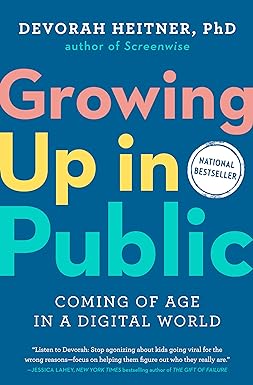
Parenting teens and tweens is a tough job, but you’re not alone. These posts might help:
Why Parents Should Worry About Their Teens Sleeping with Smartphones
Over 100 Of The Absolutely Best Gift Ideas For Teen Boys
Eight Simple Things Middle School Boys Need to Survive This Crazy Time
How Parents Can Know When to Give Your Tween More Freedom
*This post may contain affiliate links where we earn a small commission for purchases made from our site.






Leave a Comment